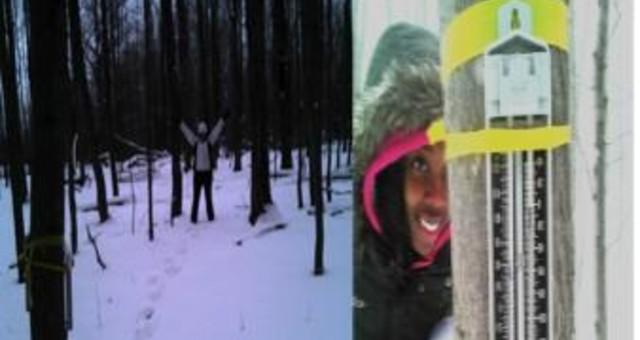January - April 2014
Bark coloration and orientation of European gypsy moth (Lymantria dispar) egg masses
We did our study on gypsy moths because we know it will impact the environment in the near future. It was first brought to our attention during our winter ecology class that there were egg masses all over the old forest trees. We did some research and knew we had to educate the public about how this was going to impact the forests. The focus of our research was the effect of orientation (north, south, east and west) and bark coloration on Lymantria dispar oviposition. Literature suggests that the orientation of oviposition on a tree affects the temperate stability that an egg mass experiences during overwintering, ultimately affecting its survival. The results of pilot studies suggested that the temperate stability of trees was directly related to the bark coloration. We tested the hypothesis that gypsy moth oviposition was random and that oviposition is not affected by bark coloration or orientation.
It is important to know whether bark coloration and orientation have an effect on egg mass oviposition and survivability because this knowledge could allow for a better understanding of these non-native species. This information could also allow us to gain more accurate predictions of population density for a given area. Accurate population density estimates allow for better preventative measures and ultimately better allocation of resources in controlling the spread of gypsy moths.
Irene: Our results were astonishing we found a large number of egg masses were laid on Black Cherry (Prunus serotina) trees, this could lead to severe defoliation upon hatching.
Octavia: I have learned that field research is a lot different than research in a lab. Many factors have to be taken into account. Simple things such as weather or the amount of sunlight available may affect sampling. For example, when conducting this research, we found that snow cover and ice hindered our visibility of egg masses and ultimately reduced our sample size. When visibility was greater and the experiment was reproduced in early spring, our sample size increased by more than double!
Irene: We remember just seeing how beautiful everything looked in the winter and what a contrast it was to spring. We went out in the field everything white covered in snow we had no idea what was under all that snow. Then in the spring we were finally able to see the ground and all the leaves starting to come out it was simply breath taking.
Octavia: Being able to go outside and identify trees and shrubs and animal footprints is something that neither of us thought that we would have been able to do. It was very cool to be able to go outdoors and identify with the living things around you. How many people can you go walking around the forest with and actually know what birds you are hearing? It was cold taking a winter course but I gained many memorable and positive experiences taking the class and would suggest it to anyone else who is thinking of taking it.
Irene: I grew up on Long Island and became interested in science because all my science teachers made class so fun. One time in my biology class in high school my teacher made us use different tools such as spoons and straws to teach us about Darwin's finches, we went around trying to pick up little beads with our tools. I knew science was going to be fun then and so I chose to major in science in college.
Octavia: I grew up in Brooklyn, NY. I cannot remember exactly when I became interested in science. I just know that in elementary school onward, I had an aptitude for the subject and ever since elementary school, it was the subject I looked forward to the most each year. I do not think I had truly considered myself particularly any "good" at it, however, until I had received a medal in junior high school for being the top performing science student. I then took several AP science classes in high school with teachers that were absolutely enthusiastic about the field that encouraged me to be passionate about the field. I also knew that I wanted to be a veterinarian since I was about six years old. I harassed my parents into many visits to the animal shelters when I was young.
Irene: I am going on to graduate school to master in holistic medicine and acupuncture. I fell in love with plants in college and cannot wait to learn more about how to use them to cure people!
Octavia: I was recently accepted into the University of Tennessee College of Veterinary Medicine. I plan on starting school there in the fall of 2014 and pursuing my D.V.M. focusing on small animal medicine and possibly shelter medicine. I am also getting married this summer which is extremely exciting. I look forward to having the last name Darwin!



